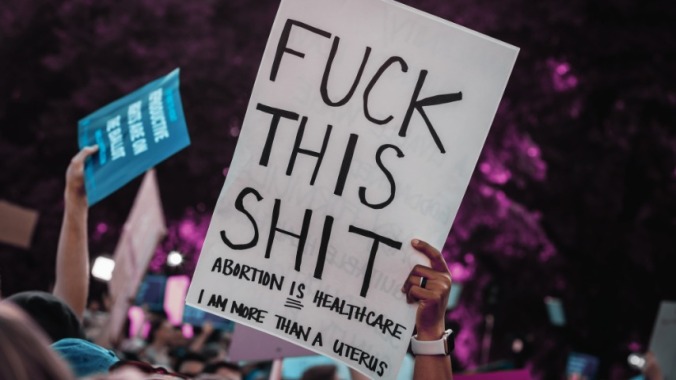Trump’s DOJ Doesn’t Care If Pregnant People Die
The DOJ dismissed a Biden-era lawsuit that would require Idaho's total abortion ban to comply with federal law and allow pregnant patients to receive emergency abortion care.
Photo: Getty Images AbortionPolitics
One of the great ironies of the Trump administration is its obsessive language about “protecting women”—entirely as a front for anti-trans bigotry, of course. In reality, the administration’s policies and positions pose a direct threat to women and pregnant people’s lives and physical safety.
On Wednesday, Trump’s Justice Department officially dismissed a Biden-era lawsuit seeking to require Idaho’s total abortion ban to comply with federal law and allow pregnant patients to receive emergency abortion care. This comes after, on Tuesday, the Idaho hospital system St. Luke’s said in a court filing that the DOJ informed them it imminently intended to drop the case. The law in question is EMTALA, the Emergency Medical Treatment and Active Labor Act, which requires hospitals that receive federal funding to provide emergency, stabilizing care to all patients—including pregnant people experiencing complications. However, Idaho’s abortion ban allows emergency abortions only when someone is imminently about to die, not just to help someone reach a stable condition. Idaho’s law entirely disregards how taking a “wait-and-see approach” can lead to fatal outcomes.
“By withdrawing this case, Donald Trump and his DOJ have decided to let women die,” Mini Timmaraju, president of Reproductive Freedom for All (formerly NARAL), said in a statement. “Rather than protect our lives and freedoms, they are following the playbook of anti-abortion extremists.” The Trump administration hasn’t publicly commented on the DOJ’s sharp reversal.
The same court filing from St. Luke’s, Idaho’s largest hospital system, requested a temporary restraining order to allow hospitals to continue providing stabilizing emergency abortions. Idaho U.S District Court Judge B. Lynn Winmill granted the TRO, barring the state of Idaho from criminalizing doctors who provide emergency abortion care for the time being. But the future remains uncertain, especially with a major hearing on Idaho’s abortion ban in the same district court slated for Wednesday—and with Trump’s DOJ having made clear they believe hospitals should let pregnant people die.
-

-

-

-

-

-

-

-

-

-

-

-

-

-

-

-

-

-

-

-

-

-

-

-

-

-

-

-

-

-

-

-

-

-

-

-

-

-

-

-








































